| Listing 1 - 10 of 11 | << page >> |
Sort by
|
Book
ISBN: 9781403919281 9780333773895 Year: 2002 Publisher: Basingstoke Palgrave Macmillan
Abstract | Keywords | Export | Availability | Bookmark
 Loading...
Loading...Choose an application
- Reference Manager
- EndNote
- RefWorks (Direct export to RefWorks)
This book concerns the significance of the English Channel in British and French literature from the 1780s onwards: a timely subject given the intense debates in progress about the actual and desired relationships between Britain and mainland Europe. The book addresses contemporary authors who use the Channel as a focus for cultural comment, comparing their approaches to those of earlier writers, from Charlotte Smith and Chateaubriand through Hugo and Dickens to historians and travel writers of the 1950s and 1980s.
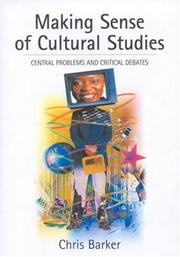
ISBN: 0761968962 0761968954 9780761968962 Year: 2002 Publisher: London Sage
Abstract | Keywords | Export | Availability | Bookmark
 Loading...
Loading...Choose an application
- Reference Manager
- EndNote
- RefWorks (Direct export to RefWorks)
Culture --- Popular culture --- Mass media and culture --- Study and teaching --- Mass media and culture. --- Study and teaching. --- Philosophy and psychology of culture --- #SBIB:309H040 --- #SBIB:316.7C120 --- Populaire cultuur algemeen --- Cultuursociologie: algemene en theoretische werken --- Cultural studies --- Culture and mass media --- Culture - Study and teaching --- Popular culture - Study and teaching
Book
ISBN: 907569766X 9789075697667 Year: 2002 Publisher: Nijmegen Vantilt
Abstract | Keywords | Export | Availability | Bookmark
 Loading...
Loading...Choose an application
- Reference Manager
- EndNote
- RefWorks (Direct export to RefWorks)
Philosophy and psychology of culture --- Sociology of culture --- Culture. --- Social sciences. --- Sociology. --- Culture --- Study and teaching --- 82:3 --- Academic collection --- #SBIB:309H040 --- #SBIB:316.7C120 --- #VCV monografie 2002 --- #KVHA:Cultural studies --- 130 --- 301.173 --- Literatuur en maatschappijwetenschappen --- Populaire cultuur algemeen --- Cultuursociologie: algemene en theoretische werken --- Cultuurfilosofie. Cultuurpsychologie --- Sociologie van de cultuur --- 82:3 Literatuur en maatschappijwetenschappen --- Culture - Study and teaching
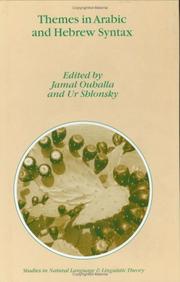
ISBN: 1402005369 1402005377 9401003513 Year: 2002 Publisher: Dordrecht Kluwer Academic Publishers
Abstract | Keywords | Export | Availability | Bookmark
 Loading...
Loading...Choose an application
- Reference Manager
- EndNote
- RefWorks (Direct export to RefWorks)
The aim of this enterprise is to assemble together in one volume works on various syntactic aspects of Arabic and Hebrew, in the hope that it will spur further comparative work within the Semitic family at the level of richness achieved in other language families such as Germanic and Romance. Although a substantial amount of work on the syntax of Arabic and Hebrew already exists in various forms, volumes of the type we have attempted are still practically non-existent. Moreover, apart from some notable exceptions, existing studies rarely take a systematic within-family comparative stance towards the phenomena they discuss, although cross-references between studies on Arabic and Hebrew are not uncommon. Obviously, we would ideally have preferred the volume to include papers on numerous other Semitic languages, including the languages of the Ethio Semitic branch as well as numerous spoken varieties of Arabic that have yet to be explored. Unfortunately, this was not possible due to circumstances beyond our control. We very much hope that the existence of this volume will make more inclusive volumes on the syntax of the Semitic languages only a matter of time.
Arabic language --- Hebrew language --- Jewish language --- Jews --- Semitic languages, Northwest --- Semitic languages --- Syntax. --- Grammar, Comparative --- Hebrew. --- Arabic. --- Languages --- Grammar, Comparative&delete& --- Hebrew --- Syntax --- Arabic --- Grammar. --- Linguistics. --- Semitic languages. --- Arabic language. --- Culture—Study and teaching. --- Theoretical Linguistics. --- Semitic Languages. --- Regional and Cultural Studies. --- Afroasiatic languages --- Linguistic science --- Science of language --- Language and languages
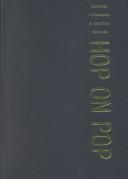
ISBN: 0822327279 0822327376 9780822327271 9780822327370 Year: 2002 Publisher: Durham (N.C.) : Duke university press,
Abstract | Keywords | Export | Availability | Bookmark
 Loading...
Loading...Choose an application
- Reference Manager
- EndNote
- RefWorks (Direct export to RefWorks)
Popular culture --- Study and teaching --- United States --- Civilization --- Study and teaching. --- Social life and customs --- Popular culture - Study and teaching - United States --- Popular culture - United States --- United States - Civilization - 1970- - Study and teaching --- United States - Civilization - 1970 --- -United States - Social life and customs - 1971 --- -Popular culture
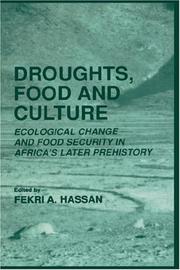
ISBN: 1280200340 9786610200344 0306475472 0306467550 9780306467554 9780306475474 Year: 2002 Publisher: New York Kluwer Academic
Abstract | Keywords | Export | Availability | Bookmark
 Loading...
Loading...Choose an application
- Reference Manager
- EndNote
- RefWorks (Direct export to RefWorks)
Recent droughts in Africa and elsewhere in the world, from China to Peru, have serious implications for food security and grave consequences for local and international politics. The issues do not just concern the plight of African peoples, but also our global ecological future. Global climatic changes become manifest initially in regions that are marginal or unstable. Africa's Sahel zone is one of the most sensitive climatic regions in the world and the events that have gripped that region beginning in the 1970's were the first indicator of a significant shift in global climatic conditions. This work aims to bring archaeology with the domain on contemporary human affairs and to forge a new methodology for coping with environmental problems from an archaeological perspective. Using the later prehistory of Africa as a comparison, the utility of this methodological strategy in interpreting culture change and assessing long-term response to current, global climatic fluctuations is examined and understood.
Africa -- Antiquities. --- Agriculture, Prehistoric -- Africa. --- Climatic changes -- Africa. --- Paleoclimatology -- Africa. --- Prehistoric peoples -- Food -- Africa. --- Prehistoric peoples --- Agriculture, Prehistoric --- Climatic changes --- Paleoclimatology --- Anthropology --- History & Archaeology --- Social Sciences --- Prehistoric Anthropology --- Archaeology --- Food --- Africa --- Antiquities. --- Social sciences. --- Culture --- History. --- Environmental management. --- Anthropology. --- Archaeology. --- Social Sciences. --- History, general. --- Regional and Cultural Studies. --- Environmental Management. --- Study and teaching. --- Geologic climate --- Palaeoclimatology --- Paleoclimate --- Climatology --- Changes, Climatic --- Climate change --- Climate changes --- Climate variations --- Climatic change --- Climatic fluctuations --- Climatic variations --- Global climate changes --- Global climatic changes --- Climate change mitigation --- Teleconnections (Climatology) --- Prehistoric agriculture --- Cavemen (Prehistoric peoples) --- Early man --- Man, Prehistoric --- Prehistoric archaeology --- Prehistoric human beings --- Prehistoric humans --- Prehistory --- Human beings --- Antiquities, Prehistoric --- Environmental aspects --- Agriculture --- Changes in climate --- Climate change science --- Culture-Study and teaching. --- Culture—Study and teaching. --- Environmental stewardship --- Stewardship, Environmental --- Environmental sciences --- Management --- Annals --- Auxiliary sciences of history --- Archeology --- History --- Antiquities --- Primitive societies --- Global environmental change
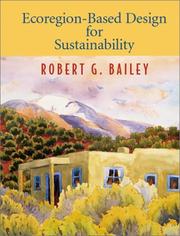
ISBN: 1280009608 9786610009602 0387225978 0387954295 Year: 2002 Publisher: New York, NY : Springer New York : Imprint: Springer,
Abstract | Keywords | Export | Availability | Bookmark
 Loading...
Loading...Choose an application
- Reference Manager
- EndNote
- RefWorks (Direct export to RefWorks)
This book completes Robert G. Bailey's celebrated study of ecoregions, begun in the landmark Ecosystem Geography (1996) and further articulated in Ecoregions (1998). In this third installment, the author expands his system for defining large-scale ecological zones to encompass principles of land management, regional planning, and design. In an engaging, non-technical discussion, he shows how larger patterns and processes that characterize a region - its climate, topography, soils, vegetation, fauna, and human culture - provide essential keys to the sustainability of ecosystems. Ecoregion-Based Design for Sustainability will be welcomed by land and resource managers, landscape architects and urban planners, ecologists, students, and anyone interested in ecology-based design. "Bob Bailey ÄisÜ the man behind the ecosystem mapping of the world." (Lingua Franca Reviews of Ecoregions) "The book provides easy access to the geographic distribution, characteristics, and processes operating behind every major ecosystem in the world." (Geoscience Canada) "For schools and colleges Ecoregions offers an invaluable source of description, interpretation and analysis of global patterns of ecosystem distribution and successfully provides the reader with a means of making sense of these patterns." (Geography) Robert G. Bailey is a geographer with the United States Forest Service in Fort Collins, Colorado, and leader of the agency's Ecosystem Management Analysis Center.
Landscape ecology. --- Ecological landscape design. --- Regional planning --- Environmental aspects. --- Environmental management. --- Regional planning. --- Architecture. --- Culture-Study and teaching. --- Environmental Management. --- Landscape/Regional and Urban Planning. --- Landscape Ecology. --- Landscape Architecture. --- Cities, Countries, Regions. --- Regional and Cultural Studies. --- Urban planning. --- Landscape architecture. --- Culture—Study and teaching. --- Ecology --- Cities and towns --- City planning --- Civic planning --- Land use, Urban --- Model cities --- Redevelopment, Urban --- Slum clearance --- Town planning --- Urban design --- Urban development --- Urban planning --- Land use --- Planning --- Art, Municipal --- Civic improvement --- Urban policy --- Urban renewal --- Regional development --- State planning --- Human settlements --- Landscape protection --- Environmental stewardship --- Stewardship, Environmental --- Environmental sciences --- Management --- Architecture, Western (Western countries) --- Building design --- Buildings --- Construction --- Western architecture (Western countries) --- Art --- Building --- Horticultural service industry --- Landscape gardening --- Landscaping industry --- Government policy --- Design and construction
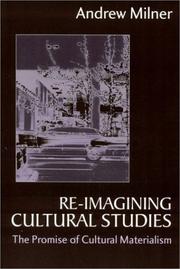
ISBN: 0761961135 0761961143 1446218708 9786610369706 1412933005 1280369701 9781412933001 9781446218709 9780761961147 6610369704 9781280369704 9780761961130 9780761961147 Year: 2002 Publisher: London ; Thousand Oaks, Calif. : Sage,
Abstract | Keywords | Export | Availability | Bookmark
 Loading...
Loading...Choose an application
- Reference Manager
- EndNote
- RefWorks (Direct export to RefWorks)
'Re-imagining Cultural Studies' restores Williams to a central position in relation to the formation and development of cultural studies. This book is a reappraisal of the Williams approach.
Social evolution --- Historical materialism --- Culture --- Socialism and culture --- Study and teaching --- Williams, Raymond, --- Criticism and interpretation --- Historical materialism. --- Social evolution. --- Williams, Raymond. --- Social Change --- Sociology & Social History --- Social Sciences --- Culture. --- Williams, Raymond --- Political and social views. --- Cultural sociology --- Sociology of culture --- Cultural evolution --- Cultural transformation --- Culture, Evolution of --- Social aspects --- Uilʹi︠a︡ms, R. --- Civilization --- Popular culture --- Dialectical materialism --- History --- Marxian historiography --- Evolution --- Social change --- Philosophy --- Culture - Study and teaching --- Williams, Raymond, - 1921-1988 - Criticism and interpretation --- Williams, Raymond, - 1921-1988

ISBN: 1402007434 0864865074 9401039267 9401005702 Year: 2002 Publisher: Cape Town : David Philip,
Abstract | Keywords | Export | Availability | Bookmark
 Loading...
Loading...Choose an application
- Reference Manager
- EndNote
- RefWorks (Direct export to RefWorks)
Refiguring the Archive at once expresses cutting-edge debates on `the archive' in South Africa and internationally, and pushes the boundaries of those debates. It brings together prominent thinkers from a range of disciplines, mainly South Africans but a number from other countries. Traditionally archives have been seen as preserving memory and as holding the past. The contributors to this book question this orthodoxy, unfolding the ways in which archives construct, sanctify, and bury pasts. In his contribution, Jacques Derrida (an instantly recognisable name in intellectual discourse worldwide) shows how remembering can never be separated from forgetting, and argues that the archive is about the future rather than the past. Collectively the contributors demonstrate the degree to which thinking about archives is embracing new realities and new possibilities. The book expresses a confidence in claiming for archival discourse previously unentered terrains. It serves as an early manual for a time that has already begun.
Archives --- Documents --- Manuscript depositories --- Manuscript repositories --- Manuscripts --- Documentation --- History --- Information services --- Records --- Cartularies --- Charters --- Diplomatics --- Public records --- Depositories --- Repositories --- South Africa --- Africa, South --- Historiography. --- Cultural heritage. --- Philosophy. --- History. --- Culture—Study and teaching. --- Ethics. --- Cultural Heritage. --- Philosophy, general. --- History, general. --- Regional and Cultural Studies. --- Deontology --- Ethics, Primitive --- Ethology --- Moral philosophy --- Morality --- Morals --- Philosophy, Moral --- Science, Moral --- Philosophy --- Values --- Annals --- Auxiliary sciences of history --- Mental philosophy --- Humanities --- Cultural heritage --- Cultural patrimony --- Cultural resources --- Heritage property --- National heritage --- National patrimony --- National treasure --- Patrimony, Cultural --- Treasure, National --- Property --- World Heritage areas
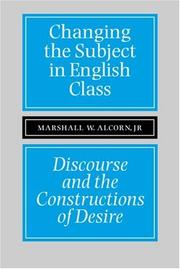
ISBN: 1429417412 9781429417419 080932427X 9780809324279 0809324202 9780809324200 Year: 2002 Publisher: Carbondale Southern Illinois University Press
Abstract | Keywords | Export | Availability | Bookmark
 Loading...
Loading...Choose an application
- Reference Manager
- EndNote
- RefWorks (Direct export to RefWorks)
Drawing on the theoretical work of Jacques Lacan, Marshall W. Alcorn Jr. formulates a systematic explanation of the function and value of desire in writing instruction. Alcorn argues that in changing the subject matter of writing instruction in order to change student opinions, composition instructors have come to adopt an insufficiently complex understanding of subjectivity. This oversimplification hinders attempts to foster cultural change. Alcorn proposes an alternative mode of instruction that makes effective use of students' knowledge and desire. The resulting freedom in expression - personal as well as political - engenders the recognition, circulation, and elaboration of desire necessary for both human communication and effective politics. Responding to James Berlin's reconception of praxis in the classroom, Theresa Ebert's espousal of disciplined instructions, and Lester Faigley's introduction of a postmodern theory of subjectivity, Alcorn follows both Lacan and Slavoj Žižek in insisting desire be given free voice and serious recognition. In composition as in politics, desire is the ground of agency. Competing expressions of desire should generate a dialectic in social-epistemic discourse that encourages enlightenment over cynicism and social development over authoritarian demands. With clarity and personal voice, Alcorn explains how discourse is rooted in primitive psychological functions of desire and responds to complex cultural needs. In its theoretical scope this book describes a new pedagogy that links thought to emotion and the personal to the social.
English language --- English philology --- Language and culture --- Report writing --- Culture --- Rhetoric and psychology --- English --- Languages & Literatures --- English Language --- Psychology and rhetoric --- Rhetoric --- Literature --- Psychology --- Cultural sociology --- Sociology of culture --- Civilization --- Popular culture --- Culture and language --- Germanic languages --- Study and teaching --- Psychological aspects --- Political aspects --- Study and teaching (Higher) --- History --- Discourse analysis --- Social aspects --- English language - Rhetoric - Study and teaching - United States --- English language - Rhetoric - Study and teaching - Psychological aspects --- English language - Rhetoric - Study and teaching - Political aspects --- English philology - Study and teaching (Higher) - United States --- Language and culture - United States - History - 20th century --- Report writing - Study and teaching (Higher) - United States --- Culture - Study and teaching (Higher) - United States --- English language - Discourse analysis
| Listing 1 - 10 of 11 | << page >> |
Sort by
|

 Search
Search Feedback
Feedback About UniCat
About UniCat  Help
Help News
News